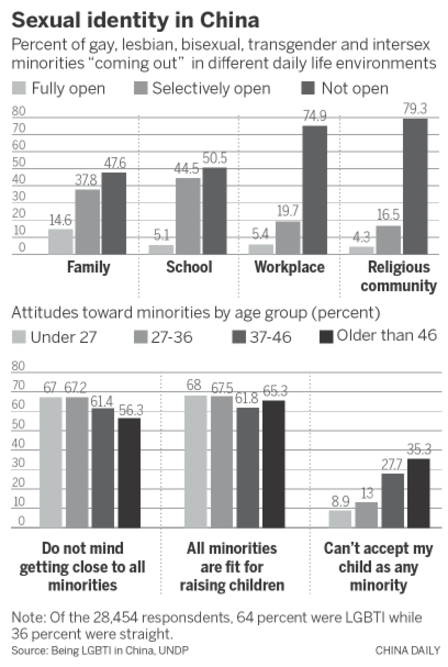Poll: Young more open to diversity in sexuality
China Daily, May 18, 2016 Adjust font size:

Only one in 20 people who belong to a sexual or gender-identity minority in China are fully open about that aspect of their life.
At the same time, the country's younger generation "is more open and accepting of sexual diversity" than their parents, a UN report said.
Half of the more than 18,000 gay, lesbian, bisexual, transgender and intersex (who do not fit typical binary notions of male or female bodies) respondents said they were not open at all about their sexual or gender identity at school, and three quarters of them remain in the closet in the workplace, according to a report released on Tuesday by the United Nations Development Programme.
"Despite social progress in the past decade, sex and gender minority groups are still largely invisible in daily life and in media," said Wu Lijuan, professor of sociology at Peking University, who led the survey, which also included more than 10,000 non-LGBTI people.
While there are no official figures about China's LGBTI population, if the numbers reflect those seen in surveys conducted overseas, they would account for 3-5 percent of the population-roughly 40 to 70 million people.
According to the report, media presentations about LGBTI people are much more common on the internet than in newspapers, radio and television. However, it is more often strengthening stereotypes than offering a balanced view, the report said.
"Oftentimes, gay male characters in the media are portrayed as feminine, and lesbians are very masculine," said Bu Wei, a professor of communication at the Chinese Academy of Social Sciences.
Among the total 28,454 respondents, two-thirds in the post-90s generation "don't mind getting close to" gay, lesbian, bisexual, transgender and intersex people, compared with 56.3 percent of those born before 1970, the report said.
Meanwhile, only 8.9 percent of the post-90s generation say they would not accept their child as a sexual or gender minority, compared with 35.3 percent of those over age 46.
There was no significant difference in the attitudes of LGBTI people and non-minorities answering those two questions, said Wu, the sociologist.
Transgender people are less accepted by society, the report said. Only about half of the respondents were supportive of building transgender bathrooms or covering sex change surgery expenses with insurance.
"The survey paints a picture of public opinion in transition, with a majority of positive, open-minded respondents, especially among the youth, together with a large portion of people who are still to make up their minds," Agi Veres, country director of UNDP China, said on Tuesday, which was International Day Against Homophobia and Transphobia.
"They simply do not know where to stand," Veres said. "In many ways this represents an important opportunity for LGBTI people and depicts a society that could achieve rapid and profound change."
Noncommercial consensual sexual acts between same-sex adults was decriminalized in China in 1997, and homosexuality was removed from the Ministry of Health's list of mental illnesses four years later.